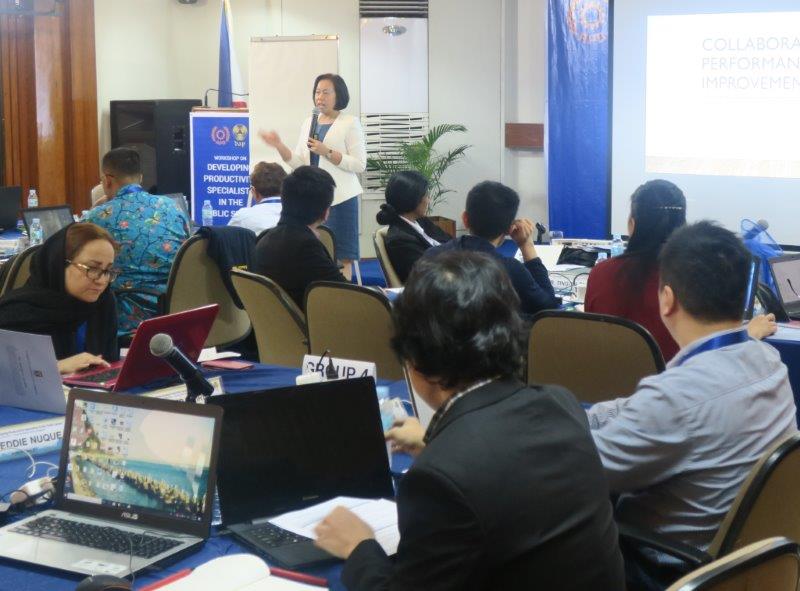
Select Page
The Asian Productivity Organization (APO) along with the Development Academy of the Philippines (DAP) organized a workshop on Developing Productivity Specialists in the Public Sector in Manila, 12–16 March 2018. The workshop was part of the initiatives of the APO Center of Excellence (COE) on Public-sector Productivity under the DAP and attended by 28 participants representing 13 APO member countries.
 The five-day workshop aimed to increase the competencies of officials from public-sector organizations, local governments, and consultants from NPOs so that they can play leading roles in driving productivity consciousness and efficiency in the delivery of government services to citizens. It was conducted by APO-assigned international experts from Canada, Indonesia, the Republic of Korea, Malaysia, the Philippines, and Thailand. APO Director for the Philippines Dr. Adoracion Navarro attended both the opening and closing sessions of the workshop.
The five-day workshop aimed to increase the competencies of officials from public-sector organizations, local governments, and consultants from NPOs so that they can play leading roles in driving productivity consciousness and efficiency in the delivery of government services to citizens. It was conducted by APO-assigned international experts from Canada, Indonesia, the Republic of Korea, Malaysia, the Philippines, and Thailand. APO Director for the Philippines Dr. Adoracion Navarro attended both the opening and closing sessions of the workshop.
Welcoming the participants, Dr. Navarro acknowledged that measuring productivity in the public sector was much more difficult than in the private sector. “In the private sector, the inputs and outputs are often well defined and the measurement of efficiency with which firms use and produce them is relatively easier. The inputs and outputs in the public sector are underpinned by the primary roles of the government as a regulator, as a provider of public goods, as a provider of incentives, and, in rare cases when the public interest requires it, as a market player itself. There is always the social value dimension, and social value is hard to measure,” she stated.
However, she pointed out that despite the limitations, there were constant efforts to devise public-sector productivity constructs. “We make necessary approximations of theoretical variables such as citizens’ trust and satisfaction with citizen-centered services. We also adopt practices from the private sector such as minimizing expenses incurred and manpower used in reorganizing production, such as in e-government or the application of ICT in delivering public services,” Dr. Navarro continued.
The APO Director for the Philippines reiterated that to develop the competencies of specialists who can play significant roles in boosting productivity in the public sector, its basic concepts must be clearly understood.
The workshop also pilot-tested a course manual drafted by the COE on Public-sector Productivity to guide the creation of specialists. Based on the feedback and review of the manual by the participants and experts, the APO will work with the COE to improve it as course material for use by future public-sector productivity-related projects.